Change Language :
How sustainable are motion plastics?
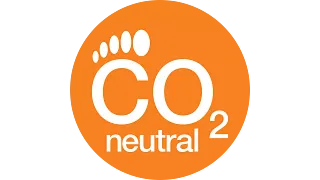
Plastic is a much-discussed material. We know that the high-performance plastics from igus can make a contribution to protecting resources and the environment and have made this aspect the focus of our business activities. Our declared goal is to become, by 2040 at the latest, CO₂-neutral across the company for all three scopes.
At our company headquarters in Cologne, we already operate our production and office space in a carbon-neutral manner in accordance with Scope 1 and 2 by using green electricity, green gas and energy-efficient measures. In order to achieve the comprehensive goal across the entire group and for all three scopes, we have divided it into short, medium and long-term goals. We present these and our already implemented measures or those planned for the current year in detail on the following page:
On this page, we show you how sustainable our motion plastics are – to do this, we look at the plastics in our products in three phases. We also introduce you to special product innovations, exciting projects and our path in relation to sustainability:
Before: Production of plastic
Environmental and climate certifications
We endeavour to achieve continuous improvements in our environmental and energy management. In doing so, we are committed to a sustainable corporate strategy with regard to ecological, economic and social aspects. We have summarised these in our energy and environmental policy.
Use of plastics offer
freedom from lubrication
27 million tonnes of lubricating grease pollute the environment worldwide every year. Our high-performance plastics offer an alternative here, as they do not require lubrication. Make your machines and systems lubrication-free too - GO ZERO Lubrication!
After: Plastics after their use
Sustainable innovations
Resource conservation projects and initiatives
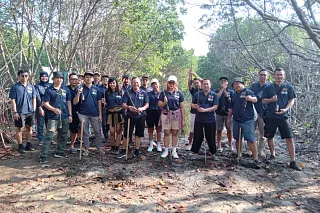
We plant new trees worldwide
Our tree planting programme began in 2019 as Christmas gifts for customers and has since grown into a large number of reforestation projects. We have planted a total of 76,280 trees to date, not just in Germany but worldwide. From saplings to large urban trees, we plant and care for trees and bushes in small and large campaigns. By creating new tree areas, we want to help reduce CO2 emissions into the atmosphere and achieve our self-declared goal of CO2neutrality.
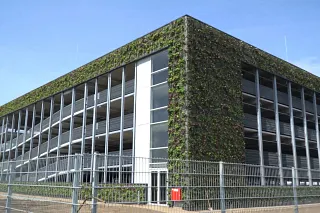
Green multi-storey car park at the igus headquarters in Cologne
Sustainable, innovative and a real eye-catcher: the new car park at igus in Cologne is an absolute eye-catcher with its year-round green façade. On a total green area of 1,015m², over 70 plants per square metre spread a pleasant atmosphere and shine in full bloom and lush leaf splendour in summer. The façade greening was designed by global market leader Sempergreen and is one of the most flexible systems on the market, with numerous sustainable benefits: retention of rainwater, increase of biodiversity through a potential habitat, reduction of noise pollution, increase of well-being for customers and employees as well as a theoretical CO2 compensation of 3 tonnes per year. Another highlight: in addition to the 484 car parking spaces, the multi-storey car park also has 83 bicycle parking spaces, inviting people to cycle to work in an environmentally friendly way.
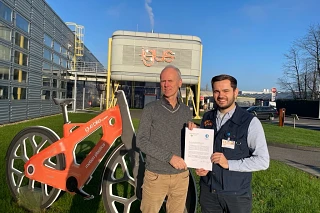
Partnership with the Cologne Climate Declaration
In December 2024, igus joined the Cologne Climate Declaration and, together with the other partners, aims to achieve climate neutrality for the city of Cologne by 2035. With this step, we are reaffirming our commitment to sustainable business practices and support for urban climate protection measures. Felix Hülder, Lean Engineer Green Production at igus, on the new partnership: "As a company, we are currently working on developing a holistic plan both for the Cologne site and worldwide, which includes a plan of action including an overarching strategy to become climate neutral."
Sustainability for our chainflex cables
Sustainability is one of the biggest challenges of our time, especially in industry. We want to address this issue with our chainflex cables. What are we already doing to make chainflex more sustainable? How can we maintain our high quality standards and reduce our ecological footprint at the same time? And can the customer also benefit from this?
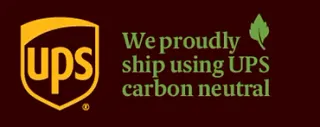
Climate-neutral shipping with UPS
As of 1 January 2024, we at igus Germany have made our shipping more sustainable and introduced a new shipping option: "UPS Carbon Neutral Shipping". Since then, we have been shipping climate-neutrally with UPS and the CO2 emissions generated when shipping our products are offset. This is done through recognised, global projects to reduce greenhouse gases, e.g. by protecting the rainforest in Brazil, through wastewater treatment in Thailand or through methane recovery in the Netherlands.
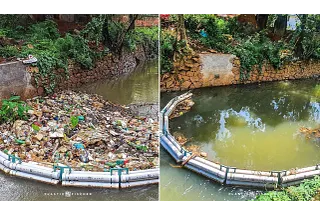
Left: rubbish washed ashore in the devices; right: after collection
Plastic Fischer - against plastic waste in rivers
8 to 12 million tonnes of plastic end up in the oceans every year, mostly via rivers. Plastic Fischer starts right here and collects the waste in the rivers, which is more cost-effective than fishing from the sea. How does the project work? People on site fish the rubbish out of rivers using equipment and receive a regular income in return. The collected plastic waste, which is usually categorised as non-recyclable, is sent to thermal recycling plants, where it is incinerated with energy recovery. igus finances the collection of a total of 10,000kg of plastic waste. This has provided at least 34 people in Kanpur and Mangalore (India) with a regular income for the duration of the collection, with helpers joining in on some days.
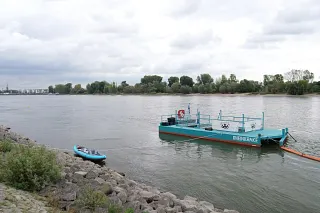
Rhine octopus - igus supports floating waste trap
Every day, one tonne of waste floats down the Rhine into the North Sea. An immense amount. The Cologne-based association K.R.A.K.E. has been organising waste collection campaigns in and around the Rhine for years. They went a big step further in September 2022 with the floating litter trap. The construction, modelled on the London model, is a passive trap into which floating rubbish drifts. The rubbish octopus is emptied regularly by the club members and the rubbish is collected on land. In cooperation with the University of Bonn, this waste is scientifically analysed in order to conduct a long-term study on plastic waste in the Rhine.
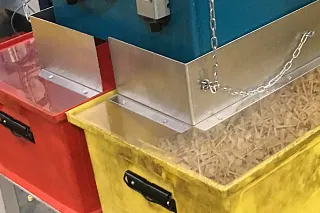
Clean igus - our initiative to avoid plastic waste
In the past, it often happened that new parts from our injection moulding machines did not end up in the collection containers, but on the floor - and therefore in the waste. The amount of waste accumulated due to the large number of productions and the large number of machines. By optimising our machines and conveyor belt in various ways, we were able to reduce the waste rate by 21% in 2021 (production waste + processed material). Gaps at transitions were closed with magnetic foils, machines and collection boxes were fitted with metal sheets and covers or lids, conveyor belts were centred and fixed in place, brushes and guide plates steer parts into the correct path, floor markings and stop wedges ensure the correct positioning.
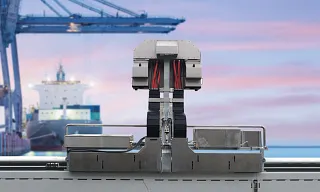
Using shore power to combat pollutant emissions in container harbours
Running diesel generators from container ships in harbours are a serious problem. Fine dust, nitrogen and sulphur oxides as well as CO2 emissions are released into the environment and atmosphere by the tonne. With the iMSPO mobile power socket, we created the possibility in 2022 for container ships to be supplied with shore power easily, quickly and, above all, flexibly. If this is then also "green", the path to the "zero-emission port" is clear.
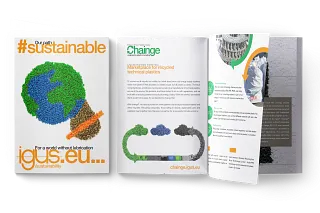
Our path to sustainability
In the brochure "Our path to sustainability", we give you an overview of our measures and progress on the various aspects of sustainability. We show you what we pay attention to when developing our materials and products in order to make them more sustainable. In a major study, we have broken down the hidden costs of lubrication and show you how much you can save with our lubrication-free products. We also present two exciting projects: Chainge, our marketplace for recycled engineering plastics, and RCYL, our plastic bicycle.

























